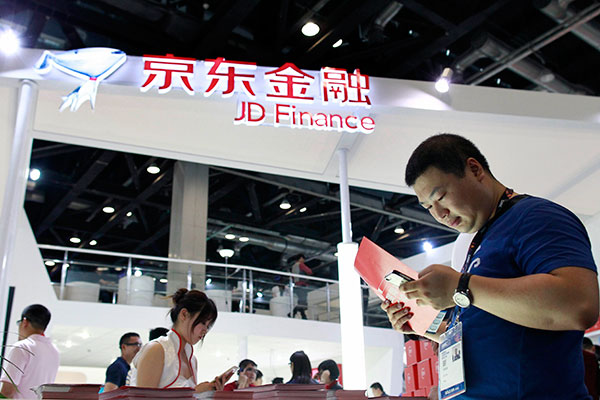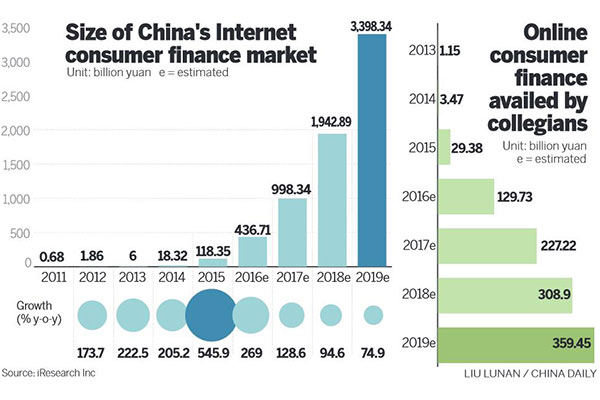
A visitor at the stand of JD Finance at a mobile Internet conference held in Beijing in April 2015.[Zhu Xingxin / China Daily]
In an economy where growth is slowing-GDP growth in 2015 at 6.9 percent was the lowest in 25 years-and focus shifting to domestic consumption from exports, consumer lending has suddenly acquired significance in China.
The consumer finance market is projected to reach 37.4 trillion yuan ($5.75 trillion) by 2019. A recent report by iResearch Consulting Group said the Internet-enabled consumer finance segment alone is expected to reach 3.4 trillion yuan in 2019 from 6 billion yuan in 2013.
Industry insiders are, however, not unduly excited by the jaw-dropping growth estimates for Web-based consumer finance. They believe it is a market with no ceiling, and project a market size that is much bigger than current estimates.
Xu Ling, general manager of JD Finance, JD.com’s consumer finance division, said, “Our research showed that less than 15 percent of the loans offered by traditional banks are for consumers. There is a lot of unmet demand waiting for us.”
Small wonder, relatively new firms such as qufenqi.com are betting on lending to even jobless, card-less youngsters.
With a base of 8 million registered users, qufenqi.com lent 11.5 billion yuan in 2015 at interest rates lower than that of credit cards issues. It turned profitable in December in spite of heavy investment to expand its business to 2,500 colleges in China.
Luo Min, 33, who founded qufenqi.com in March 2014, harnessed both the Internet and big data technology to mine a fortune from 1,000-10,000 yuan ($608-$6,080) loans to perceived high-risk consumers like college students.
“Many college students don’t have credit cards but they do need cash to buy, say, a new smartphone or for treating friends to a decent dinner,” Luo said.
Qufenqi offers loans to meet such needs. On an average, collegians borrow up to 1,000 yuan and make monthly repayments of about 100 yuan.

The booth of Ant Financial, a finance arm of Alibaba Group Holding Ltd, at an Internet finance expo in Hangzhou in November 2015.[Long Wei / China Daily]
Online consumer finance mainly works in two ways. One, consumers can buy products or services on e-commerce platforms first and pay in installments later.
Two, they can avail loans upfront that are credited to their online payment accounts with AliPay and such, and repay over a period of time.
According to Luo, a monthly repayment of 100 yuan is considered affordable now. Although its business might appear risky, qufenqi.com does due diligence of its debtors.
“We screen consumers’ online shopping records to assess their consumption power. We also verify the contact information of their parents. We have 10,000 part-time employees who visit student dormitories at colleges for due diligence,” Luo said.
Like qufenqi.com, China’s Internet giants such as Baidu Inc, Tencent Holdings Ltd and Alibaba Group Holding Ltd, as well as smaller players, have jumped on the online consumer finance bandwagon.
Borrowers love what they offer: convenience, lower rates and ease of obtaining loans.
Online lenders steer clear of lengthy application processing and stiff qualifications for borrowers that typify banks and traditional private lenders.
For instance, qufenqi.com waives interest in the first month. So, borrowers repaying within a month can avail interest-free loans. A 1,000-yuan loan for three months entails monthly payments of 347.88 yuan each. That is, repayments total 1,043.64 yuan, suggesting an interest amount of 43.64 yuan per quarter, marginally lower than the 50 yuan that credit card firms charge on comparable loans.
For its part, JD.com’s consumer finance division started Baitiao in 2014, a virtual credit card service that allows some of its online shoppers to buy products first and repay in installments.

The rise of online firms suggests the consumer finance market in China is too big for credit card issuers alone to serve.
Some 800 million Chinese constitute the potential consumer finance market. Of them, about 500 million do not have any credit information in traditional banking organizations, said analysts.
“This means, it is difficult for them to apply for credit cards or borrow money from traditional banks,” said Liu Yannan, chief executive officer of Beijing Tiandao Jiran Technology Co Ltd, which, in 2015, launched an app offering loans to buyers of used cars and consumer electronics.
“It is very difficult for traditional banks to offer small loans to consumers without any credit record. The cost and risk would be very high compared with offering loans to big-name enterprises.
“But through big data technology, it is easy for Internet firms to find out who can be good debtors, by analyzing their online footprints, such as their shopping records, occupation and educational backgroud of their friends on social networking apps,” said Liu.
Xu of JD Finance agreed. The cost of finding a qualified borrower is next to zero for JD Finance thanks to parent JD.com’s vast data on its online shoppers, he said. JD Finance, he said, has “profiled”, or verified the creditworthiness of, 100 million shoppers on JD.com.
Even consumers who have credit cards appear to prefer online consumer finance due to its convenience and efficiency, said Min Jie, 30, who recently bought a new flat. He spent tens of thousands of yuan online in 2015, decorating it. After maxing out his credit card, he turned to Internet finance companies.
“Asking banks to raise my credit limit was proving to be time-consuming. You need to make phone calls first, then demonstrate your financial situation and wait for their approval. So I used JD’s Baitiao service as an alternative. Based on my previous shopping record, they immediately granted me 10,000 yuan in credit,” Min said.
Xiong Yuan, 27, a female white-collar worker in Beijing, took another route to easy finance. She did not really need the money but wanted to boost her online credit score. So, she logged into Ant Check Later, an Internet consumer finance product of Ant Financial Service Group, which is backed by Alibaba Group Holding Ltd.
Ant Financial’s credit scores, ranging from 350 to 950, are based on analysis of consumers’ online behavior. A score higher than 750 attracts VIP perks like travel to Singapore without visa application or priority check-in at some airports in China.
“By borrowing about 1,000 yuan every month via Ant Check Later, I made online purchases, but repaid the money in time over the last six months. So, my credit score has increased from 670 to 709 and nearing my goal of exceeding 750,” Xiong said.
According to Ant Financial, its consumer finance service has significantly boosted the consumption of online shoppers. “Those who used to spend less than 1,000 yuan a month have increased their spending by 50 percent after using the service,” the company said in an email to China Daily.
Consumer finance is clearly a priority for the government as well, given the thrust on economic growth through domestic consumption rather than exports.
In June 2015, the government expanded its pilot zone of consumer finance from 16 cities to the entire nation. Private companies, domestic and overseas banks, and Internet firms are all encouraged to set up consumer finance business.
Analysts said it is unlikely that regulators will restrict the development of the sector. Li Chao, an analyst with iResearch, said for the consumer finance market to blossom fully, service providers need to improve their risk management and create more “offline scenarios”.
“There is still room for improvement in the accuracy and cost of risk control, given the market is still in its early stage. Consumer finance companies need to come up with more ideas to encourage people to use their services.
“Most of the small loans are made to online shoppers, those who are about to travel or buy cars. They need to think more creatively to create more opportunities for consumers to use the service,” Li said.
Like in any lending business, bad debts are but natural. But, Internet finance firms, being mostly privately held startups, are not obliged to disclose the rate of bad debts. Industry insiders, however, estimated defaults could be around 1 percent of total loans.
